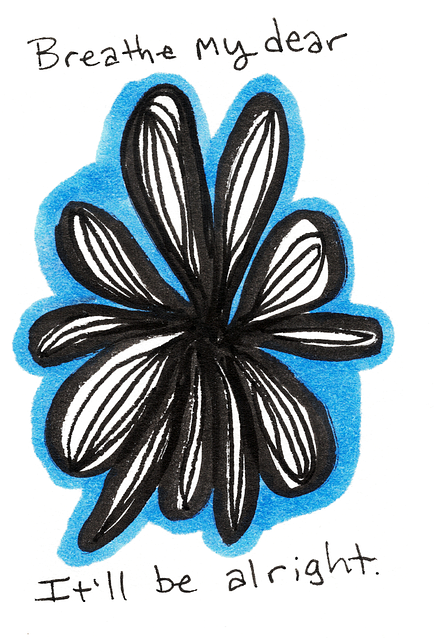Anxiety disorders, characterized by excessive worry and fear, are managed through cognitive-behavioral therapy (CBT), which targets negative thought patterns. CBT combines talk therapy with coping strategies, offering tools to challenge distorted beliefs and replace them with realistic perspectives. Integrated approaches in Gilbert, AZ, include mindfulness practices, exposure therapy, and other techniques for comprehensive relief from anxiety symptoms.
Anxiety disorders affect millions, but there’s hope in Gilbert, AZ. This comprehensive guide explores effective strategies for managing anxiety, highlighting Cognitive-Behavioral Therapy (CBT) as a powerful tool. We delve into CBT techniques for challenging negative thoughts and behavioral strategies to reduce anxiety triggers. Learn how to create a supportive environment for healing and discover the benefits of integrating CBT with other therapeutic approaches for optimal well-being.
- Understanding Anxiety Disorders: Symptoms and Causes
- Cognitive-Behavioral Therapy (CBT): A Powerful Tool
- CBT Techniques for Challenging Negative Thoughts
- Behavioral Strategies to Reduce Anxiety Triggers
- Creating a Supportive Environment for Healing
- Integrating CBT with Other Therapeutic Approaches
Understanding Anxiety Disorders: Symptoms and Causes

Anxiety disorders are a group of mental health conditions characterized by excessive and persistent worry, fear, and anxiety that interfere with daily life. These disorders can manifest in various forms, such as generalized anxiety disorder (GAD), panic disorder, social anxiety disorder, and phobias. Symptoms may include restlessness, muscle tension, difficulty concentrating, irritability, insomnia, and in severe cases, panic attacks. The causes of anxiety disorders are multifaceted, involving a complex interplay between genetic predisposition, environmental factors, brain chemistry, and past traumatic experiences.
Cognitive-behavioral therapy (CBT) is a highly effective strategy for managing anxiety disorders. It focuses on identifying and changing negative thought patterns and behaviors that contribute to anxiety. Through CBT, individuals learn coping mechanisms, relaxation techniques, and problem-solving skills to effectively manage their symptoms. Anxiety therapy in Gilbert, AZ, often incorporates CBT alongside other evidence-based practices to provide comprehensive care tailored to each individual’s unique needs, ultimately enhancing their overall mental health and quality of life.
Cognitive-Behavioral Therapy (CBT): A Powerful Tool

Cognitive-Behavioral Therapy (CBT) is a highly effective approach to managing anxiety disorders, recognized worldwide as one of the leading evidence-based treatments. This powerful tool equips individuals with the skills to identify and challenge negative thought patterns and behaviors that contribute to anxiety. CBT focuses on the present and future, helping clients understand how their thoughts and actions impact their emotions and experiences.
In the context of Mesa anxiety treatment or anxiety therapy Gilbert, CBT provides a structured framework for individuals to learn coping strategies tailored to their unique needs. Through counseling for anxiety, patients can navigate the intricate web of anxious thoughts, feelings, and behaviors, ultimately fostering a sense of control and improved well-being.
CBT Techniques for Challenging Negative Thoughts

Cognitive Behavioral Therapy (CBT) offers powerful techniques to challenge and change negative thought patterns that contribute to anxiety disorders. This therapy focuses on identifying distorted or unhelpful thoughts and replacing them with more realistic, balanced perspectives. One effective CBT strategy is thought recording, where individuals keep a log of their anxious thoughts, recording when they occur, how often, and the evidence for and against those thoughts. By examining these patterns, people can learn to recognize irrational beliefs and replace them with more rational alternatives.
Additionally, CBT introduces behavioral experiments to test the validity of negative thoughts. This involves gradually engaging in activities previously avoided due to anxiety and observing the outcomes. Over time, this process helps individuals realize that their feared consequences rarely materialise, thereby reducing anxiety and fostering a more positive outlook. These techniques, when practiced consistently, empower individuals to manage their anxiety effectively and improve overall mental health, making counseling for anxiety in Gilbert, AZ a viable and transformative option.
Behavioral Strategies to Reduce Anxiety Triggers

Anxiety disorders can be triggered by various factors, and one effective way to manage them is through behavioral strategies taught in cognitive-behavioral therapy (CBT). This form of therapy helps individuals identify and change unhelpful thought patterns and behaviors that contribute to anxiety. For instance, exposure therapy, a common CBT technique, gradually exposes clients to situations or objects they fear, helping them face their anxieties head-on. Over time, this reduces the intensity of anxiety responses.
Additionally, learning relaxation techniques like deep breathing exercises, mindfulness meditation, and progressive muscle relaxation can significantly lower anxiety levels. These strategies promote a sense of calm and control, empowering individuals to better manage stress triggers. Many counseling for anxiety services in Gilbert or Mesa incorporate these behavioral approaches as part of their comprehensive mental health counseling programs, offering clients practical tools to overcome anxiety disorders once and for all.
Creating a Supportive Environment for Healing

In a city like Gilbert, AZ, where life can be fast-paced and stressful, creating a supportive environment for healing is paramount when addressing anxiety disorders. This involves establishing a safe, non-judgmental space where individuals feel comfortable exploring their thoughts and emotions without fear of criticism or stigma. Cognitive-behavioral therapy (CBT), a highly effective approach in the realm of anxiety therapy, often thrives in such environments. By combining talk therapy with practical coping strategies, CBT helps clients identify and challenge negative thought patterns and behaviors, fostering a sense of control over their anxious responses.
When seeking Mesa anxiety treatment or counseling for anxiety in Gilbert, individuals can benefit from dedicated therapists who create an atmosphere conducive to healing. This includes using evidence-based techniques tailored to each client’s unique needs. Whether it’s helping them navigate stressful situations, develop relaxation strategies, or learn new ways of thinking and behaving, a supportive environment enables clients to embrace the process of managing their anxiety effectively. Through consistent practice, these skills can lead to significant improvements in overall well-being.
Integrating CBT with Other Therapeutic Approaches

Combining Cognitive Behavioral Therapy (CBT) with other therapeutic approaches has proven to be a powerful strategy in managing anxiety disorders. While CBT is an evidence-based method that focuses on identifying and changing negative thought patterns, other modalities can enhance its effectiveness. Mental health counseling in Gilbert, AZ often integrates techniques from mindfulness-based practices, such as meditation and breathing exercises, to help individuals develop a greater sense of calm and present-moment awareness. This complementarity ensures a holistic approach, addressing both the cognitive and emotional aspects of anxiety.
For instance, a Chandler anxiety therapist might incorporate elements of exposure therapy into CBT sessions, gradually exposing clients to anxiety-provoking situations in a safe environment. Additionally, Mesa anxiety treatment centers may utilize art or music therapy alongside CBT to help individuals express and process their emotions more effectively. These integrated approaches cater to diverse learning styles and can offer more comprehensive relief from anxiety symptoms, making therapy more accessible and beneficial for each unique client.
